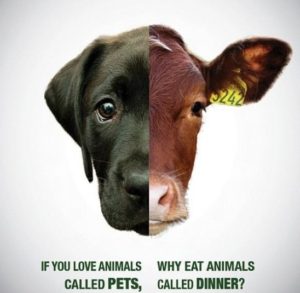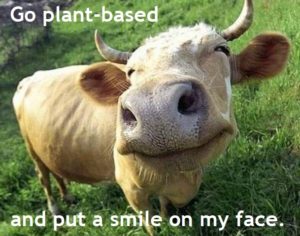
A 2018 study 1 looked into the association between choosing to eat a plant-based diet as an adult and having had pets as a child.
Previous studies 2 3 4 have shown that having pets as a child is a good predictor of the the likelihood that you will adhere to some sort of plant-based diet in adulthood.
Blog Contents
Quantity matters when it comes to pets
So, taking this previous research into account, this study wanted to test the hypothesis that the number of different types of pets owned in childhood is positively associated with a reduction of animal consumption in adulthood.
Within the people covered in the study, the number of different types of pets owned in childhood ranged from 0 to 6.
Study results
They found that individuals who grew up around a greater variety of pets (i.e., hamsters, dogs, birds, and cats, as opposed to any number of dogs alone) were more likely to engage in greater degrees of meat avoidance (i.e., vegan as opposed to semi-vegetarian) in adulthood.
Those children who had a greater number and variety of pets as children were significantly more likely to end up as vegans as adults.
The researchers concluded: “Findings support the hypothesis that individuals who owned a greater variety of pets in childhood endorse more concerns regarding animal use. This, in turn, appears to predict the decision to refrain from animal products in adulthood.”
Final thoughts
I suppose most of us would have predicted the above outcome, although it was interesting to see that greater number and variety of childhood pets is strongly associated with greater meat avoidance in adulthood. This all seems to be linked to a ‘circle of compassion‘, as the study says, although this compassion does not necessarily have to mean that, as a child, you had a ‘cuddly’ relationship with the pets. For instance, having childhood pets such as horses, sheep, goats , snakes, hedgehogs, etc (with which you would be unlikely to have the sort of intimate relationship expected from a dog or cat), was still a strong predictor of meat avoidance in adulthood.
Whilst my main concern for promoting a WFPB diet is linked to its benefit for human health, there is a direct link with benefits for all other species on this small blue planet, as well as the planet itself.
So it may be claimed that making the decision to go plant-based could, in the long-run, be a win-win for all concerned.

References
- Appetite. 2018 Apr 1;123:43-48. doi: 10.1016/j.appet.2017.12.005. Epub 2017 Dec 7. Ethical concerns regarding animal use mediate the relationship between variety of pets owned in childhood and vegetarianism in adulthood. Heiss S, Hormes JM. [↩]
- Paul, E. S., & Serpell, J. (1993). Childhood pet keeping and humane attitudes in young adulthood. Animal Welfare, 2, 321e337 [↩]
- Paul, E. S., & Serpell, J. (1994). Pets and the development of positive attitudes to animals. In A. Manning, & J. Serpell (Eds.), Animal and human Society: Changing perspectives (pp. 127e144). New York, NY: Routledge. [↩]
- Rothgerber, H., & Mican, F. (2014). Childhood pet ownership, attachment to pets, and subsequent meat avoidance. The mediating role of empathy toward animals. Appetite, 79, 11e17. [↩]